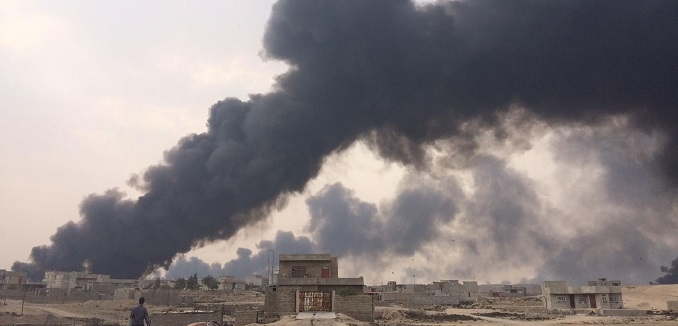On October 17, the Iraqi government officially declared its plans to liberate Mosul from the Islamic State, more than two years after the city was captured. Unfortunately, winning will require cooperation many different parties. The Shiite government of Iraq, as well as the country’s Shiite militias, both want to be involved in the recapture of Mosul. So do Sunni actors, which include Iraqi tribes, Turkey, and the Kurds. And then there are the forces of the Yazidis and Christians.
The Iraqi national army is under great pressure to succeed in Mosul, as failing would weaken the national government and strengthen the militias. The government has gathered over 50,000 troops for the battle. An effective attack in Mosul, using the minimum number of Shiite militiamen, would mean less dependence on Iran, because the militias essentially function as Iranian proxies on the ground.
The militias are collectively called the Popular Mobilization Forces (PMFs), and comprise about 100,000 fighters in total, although only 14,000 or so are taking part in the Mosul attack. The PMFs are largely Islamists who want to establish a Shiite theocratic regime in Iraq. They view the Iraqi forces as weak and unable to protect the country, and would like to have a similar role in a future Iraq as the Iranian Revolutionary Guards have in Iran.
The Sunni Arab tribes view the PMFs as a threat to their people, with an intent to further deepen sectarian divides by brutally enforcing Shiite domination of Iraq. Although the Shiites are the majority in Iraq, the Sunnis are predominant in the north and west of the country, which includes Mosul.
The Turks have also insisted on participating in the fight for Mosul—Turkish president Recep Tayyip Erdogan has sent 2,000 troops into the area, and have rejected Baghdad’s demand that they withdraw. Turkey considers Mosul as part of its own territory, dating back to the Ottoman Empire. The Ottomans lost Mosul in 1926 with the League of Nations granting the rights to the British Mandate in exchange for economic concessions. The Turks also want to be the regional protector of Sunni interests.
The PMF have vowed to ignite a sectarian war if Turkey does not withdraw. “The invaders have not been welcomed by the Iraqi government,” PMF spokesperson Yousif al-Kilabi warned. “Therefore, if they insist on staying in Iraq we will treat them as enemies. We fight them the same way we fight ISIS.” Furthermore, the Badr Organization—one of the more prominent PMFs—stated that they “advise Erdogan to come to his senses and withdraw his soldiers before we send them back home in boxes.”
The Turks also have another concern regarding Mosul—the involvement of the Turkish Kurds.
The Kurdistan Workers Party (PKK), the Kurdish armed group that Turkey and Western allies consider a terrorist organization, has more than 5,000 fighters and clearly aims to be part of the Mosul liberation process. This is demonstrated by the Sinjar Resistance Unit, a PKK creation consisting mainly of Yazidi fighters. Its military commander, Haval Mazloum, has declared that “it is already decided that we would participate in liberating Mosul.” It is highly unlikely that the PKK will play a significant role in the battle, but their objective is more symbolic. The PKK’s ultimate goal is to be recognized as a force on the ground, legitimizing its efforts and presence with the international community. This plan is working. The Iraqi government has welcomed the PKK, and even went so far as pushing for representative offices to be opened in the country.
Meanwhile, the Turks are allied with the Kurdistan Regional Government (KRG), a semi-autonomous government in northern Iraq led by President Massoud Barzani. Barzani supports the Turkish intervention as insurance against the PMF trying to seize upon the Mosul campaign to push the KRG from the area. There are about 40,000 KRG Peshmerga fighters involved in the campaign. As Barzani’s son Masrour explained to Sky News, “We are not extending the territories; we’re just regaining what was originally ours. All the areas the Peshmerga are controlling we believe is part of Kurdistan and there’s no reason for the Peshmerga to leave those areas.”
The Kurdish Peshmerga forces have so far liberated roughly 30 villages around Mosul. It is unlikely that Kurds will be willing to have sacrificed their Peshmerga forces without gaining anything permanent in return. Since the KRG is taking the lead in this operation, they will expect to take the lead in administrating Mosul after the fall of ISIS—though splits between the KRG’s political parties may create further complications.
Finally, there are the Iraqi Christians, who plan to play a significant role in the battle for Mosul. The Christians, along with the Yazidis, were victims of ISIS, which forced hundreds of thousands of religious minorities to flee in 2014. Now, an estimated 1,500 Christian fighters, including the Babylon Brigade, are ready to take arms against ISIS.
To take back Mosul, all of these forces will have to coordinate and cooperate. Based on their diverse, and sometimes conflicting interests, this may get complicated. The stakes are high, both for the future of Iraq, and for the international community.
Diliman Abdulkader is a Research Associate at the Endowment for Middle East Truth (EMET); Adam Turner is EMET’s General Counsel.
For more on this subject, read Seth J. Frantzman’s recent dispatch from Mosul.
[Photo: UNEP / flickr]




